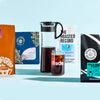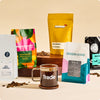Part community-building event, part professional development workshop, participating as a judge for the United States Brewers Cup is always an enriching experience. After a two year break, this year’s edition at the Specialty Coffee Expo in Boston was no exception.
Several times a year, the US Coffee Champs (USCC) holds coffee qualifying rounds in a variety of categories, all leading up to the chance for finalists to compete on the national stage. USCC holds regional, qualifying, and US championship events in the following competitions: Barista, Brewer’s Cup, Cup Tasters, Roasting, Latte Art, and Coffee in Good Spirits.
The USCC, founded by the Specialty Coffee Association, helps put on these events at a national level, and competitors who win at the national level, go on to represent the US and compete at the World Coffee Competitions.
I particularly like to focus on judging Brewer's Cup, which is my favorite competition. With Brewer's cup, a competitor is required to choose a coffee and brew three uniform cups for three different judges. Their presentation should reflect the coffee they’ve chosen — down to the way they are brewing it, and how their brewing method affects the flavors the judges will taste.
The stated goal of the competition, according to World Brewer’s Cup, is “to showcase the craft and skill of filter coffee brewing by hand, promoting manual coffee brewing and quality of service.” With this competition, I’ve had the pleasure of trying some amazing and very special coffees over the years, along with the privilege of learning from every routine I’ve ever evaluated.
Why compete?
Competition is a great way to showcase your brewing and barista skills, and can be really beneficial for the competitor in a number of ways, depending on how they approach competition. Many folks compete to progress their careers, and make a name for themselves. It’s also been a groundbreaking way for competitors to make their voices heard about change in the industry.
Along the same lines, Brewer’s Cup is a great way for a competitor to showcase their creative side, often demonstrating personal brewing innovations that affect the cup being served.
It’s not all about the limelight, however. Competing is a fantastic way to push yourself and your coffee skills, developing and strengthening your palate along the way.
Why judge?
I’ve tried the competition thing, and it’s just not for me. I get a lot out of judging, though! To break it down, a judge evaluates a competitor based on the rules of the competition. So, you have to have a thorough understanding of the competition and the rules in order to participate, as well as a certain level of coffee evaluation experience.
As someone who is interested in evaluating coffee on a higher level — and does it as part of their job — I look at this as a great opportunity to put my palate to work with four long days of tasting and evaluating coffee. Above all, I look at it as an opportunity to support the competitors by giving rules based feedback to encourage them as they progress in their coffee and competition careers.
What is calibration?
Calibration is essentially the process of coming together to find a common ground on what stuff tastes like. We’re calibrated via the SCA flavor wheel and the World Coffee Research sensory lexicon, and we spend an entire day leading up to the competition trying to find a common thread on how to both score and taste individual elements of the brews.
Successful calibration happens through plenty of coffee analysis, with volunteers performing mock routines for the judges to score. This allows us to discuss what numbers and scores we’re giving everyone, so that scores can be consistent and fair amongst judges. In addition to calibrating on scores, we usually calibrate on elements of the flavor wheel and what those items taste like. It’s amazing how the acidity of a blood orange pops compared to a grapefruit, and limes have a surprising florality!
When judges analyze a coffee, we’re looking at it from the perspective of the scoresheet, which is broken down into different elements: aroma, flavor, aftertaste, acidity, body, balance, overall. We fill in each category according to our sensory experience of that coffee, producing a well-rounded and very personalized evaluation.
We’re looking for accurate flavor calls, too. That means when the competitor describes the coffee, we’re scoring for quality, accuracy, and relevancy under “taste descriptions,” as we measure both how accurately the coffee was described and provide our individual evaluations.
What’s it like to judge?
I know judging sounds like a ton of fun, because it is! But it’s also super-challenging and rewarding at the same time. The total commitment for nationals is three to four days, with the fourth day dependent on if you are invited to judge finals or not. The first day is a full day of calibration, and days two and three are competition days. Each day of competition, you can expect to arrive at the convention center early in the morning for daily calibration, and stay for most of the day, depending on how many panels you’re judging. It’s highly important to stay hydrated, and to not forget to eat lunch! You want to keep yourself healthy and feeling good, so that you can be equally present for every competitor.
Overall, competition is a great way to grow as a coffee professional, no matter if you're a judge or competitor. It can also be a great way to network with a wonderful community of coffee professionals, as you get to know and support different peers in the industry at large. The spirit of competition encourages this kind of collaboration — and that's something that I hope to be a part of for a long time.









